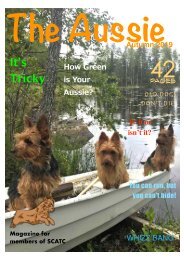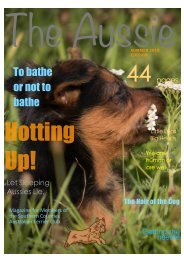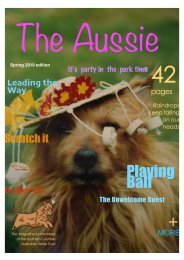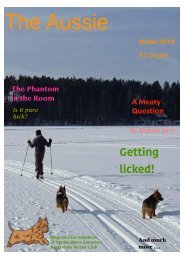The Aussie Magazine Autumn 2020
For members of the Southern Counties Australian Terrier Club
For members of the Southern Counties Australian Terrier Club
Create successful ePaper yourself
Turn your PDF publications into a flip-book with our unique Google optimized e-Paper software.
Super Sniffers at Work
If successful, it could also add to Medical DetecJon
Dogs’ understanding of what the profile for cancer
smells like and provide more informaJon for their cancer
detecJon dogs to learn from in the future. Four dogs are
currently being assessed with a view to 2 working on the
full project. The dogs are a mixture of Labradors and
spaniels.
Urine samples from dogs with and without cancer have
been collected by Davies Veterinary Specialists and have
been used to train dogs to detect the difference and will
be used to test how accurate they are. The idea for the
project first came when Medical DetecJon Dogs CEO and
Co-Founder, Claire Guest, took her own cancer detecJon
dog, Daisy, to Vet Oncologist at Davies Veterinary
Specialists, Isabelle Desmas-Bazelle, for treatment for
cancer.
Sadly, some Aussies are diagnosed with cancer. For many
breeds it can be the most common cause of losing a
beloved family dog. Treatments to help cure and manage
cancer in both humans and dogs are becoming increasingly
more successful, but the key is diagnosing as early as
possible.
We know that the Medical DetecJon Dogs Charity has
made great in roads in detecJng some common forms of
cancer in people. However, recently they were asked the
quesJon -
Can dogs detect cancer in other dogs?
That was the quesJon asked by the Medical DetecJon Dog
Charity. At last they have begun to answer the quesJon.
A study into whether cancer detecJon dogs can sniff cancer
in another dogs’ urine sample is being carried out for the
first Jme in the UK by the charity Medical DetecJon Dogs.
The project will invesJgate what would be a cheap, rapid
and non-invasive diagnosJc test for canine bladder cancer
by training dogs to detect the cancer from the odour of
urine samples.
Canine Urinary TransiJonal Cell Carcinoma (TCC) can look
like several other urinary tract disorders when tested for,
meaning diagnosis can be tricky.
The 2 experts started to quesJon whether canines could
detect cancer in other canines and Daisy was presented
with some samples of urine from dogs with and without
the disease. She picked out the posiJve samples quite
easily.
Claire Guest says: “Dogs are renowned for their sense of
smell and we know from many years of the dogs’ ability
to detect human cancer, that it is a disease that has
characterisJc odours that they can pick out very
successfully.
“It seems obvious that they could do the same for canine
cancer and as the current screening tests are oden
inaccurate, not to menJon very unpleasant for our
beloved pets, we are very much looking forward to
showing that dogs themselves could be the key to
diagnosing this disease early in their four-legged
counterparts.
Isabelle Desmas-Bazelle says: “Current methods of
diagnosis can be slow and yield misleading outcomes –
for example a posiJve result can be because of other
non-cancerous condiJons such as infecJon. This means
that vets may target infecJon when in fact the dog could
have cancer.”
One possible method of looking for TCC is cystocentesis –
when a needle is inserted into the bladder to take a sample
of urine – but is best avoided as it can risk spreading the
tumour.
DefiniJve diagnosis requires taking Jssue from the
suspicious area so a medical scienJst can look at it under a
microscope which is invasive, costly and delays the results
and therefore treatment.
The proof of principle study, a collaboraJon with Davies
Veterinary Specialists and part funded by The Kennel Club
Charitable Trust, will invesJgate this innovaJve test, which
has the potenJal to make dramaJc improvements to the
diagnosis and outcome of canine bladder cancer.









